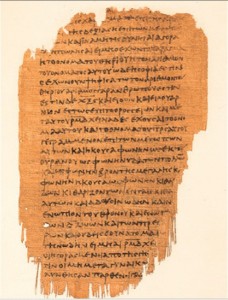The English word ‘inspiration’ has an interesting history, dating from perhaps the early part of the 14th century. The basic underlying idea is of an external influence or stimulation producing extraordinary effects within a given object or person. Within theology, where the word (and its associated verb, ‘to inspire’) seems to have developed, its origin can be traced to the version of the Bible known as the Latin Vulgate. Here, a number of verses in both the Old and New Testaments contain the Latin verb inspiro or the noun inspiratio.
As the English Bible developed, the word acquired a technical meaning with reference to the production of the Biblical writings themselves. It became associated exclusively with 2 Timothy 3:16 where the Latin Vulgate reads omnis scriptura divinitus inspirata. This was then rendered by Wyclif as “Al Scripture of God ynspyrid is ….”
The perpetuation of ‘inspiration’
When the Greek text was first translated into English, the word ‘inspiration’ remained within the renderings of 2 Timothy 3:16. See the following:
- William Tyndale (1525): “For all scripture geve by inspiracion of god is ….”
- King James Bible (1611): “All scripture is given by inspiration of God …”
- Revised Standard Version (1946): “All scripture is inspired by God …”
Now a part of the ‘King James tradition,’ the word becomes the established technical term to speak of the means by which God influenced Biblical writers to ensure that that which was written was wholly and divinely trustworthy. The doctrine of inspiration meant that all Scripture was inspired, whatever that might have meant. For the term is actually rather misleading and is not a good translation of the phrase written by Paul to Timothy.
A better translation
The key word in this phrase in the Greek text is theopneustos. It is a compound of two words literally meaning: ‘breathed by god,’ or ‘god-breathed.’ This is reflected in a number of more recent versions such as:
- New International Version (1973): “All Scripture is God-breathed …”
- English Standard Version (2001): “All Scripture is breathed out by God …”
Where the word ‘inspiration’ technically speaks of ‘the act of breathing in’ or ‘inhalation,’ theopneustos speaks more of ‘expiration’ or ‘exhalation.’ So it is not that God breathed into the Bible, rather that God breathed out his word.
As such it would be more accurate to speak of the ‘Expiration of Scripture,’ though that would present problems of its own! To speak of the ‘God-breathedness of Scripture’ is rather contrived and somewhat convoluted, so perhaps the ‘Exhalation of Scripture’ would be more useful.
Some would argue that we should accept a special meaning of the word ‘inspiration’ when it comes to Scripture within a technical context, though we need to be careful when speaking with others who may not share this understanding. I might well have inspiration writing poetry, but that is not the meaning of the word here. It might be useful to think more in terms of ‘exhalation’ and simply to speak of Scripture as having been ‘breathed out’ by God.
Patrick Boyns
 This article is from BiBloS, a teaching resource of the British Bible School. To read more articles or download the whole of Issue 2, click here.
This article is from BiBloS, a teaching resource of the British Bible School. To read more articles or download the whole of Issue 2, click here.

